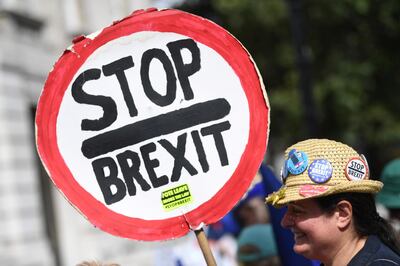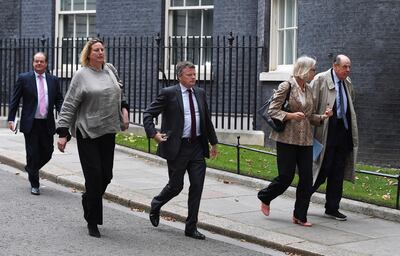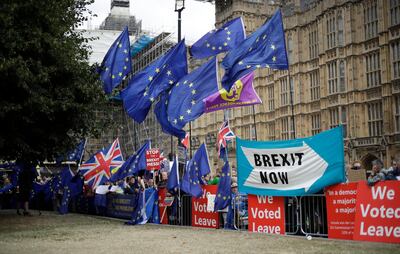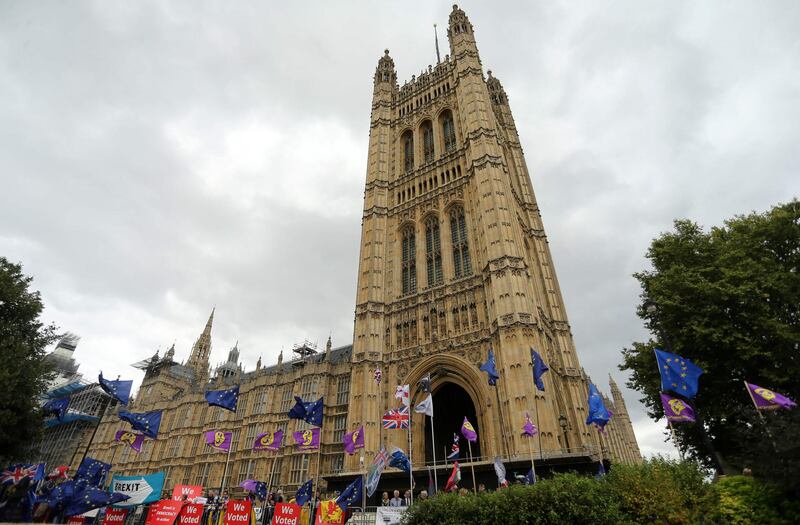The coming days look set to be ones of high drama in the political crisis that Brexit has induced in the UK. Parliament resumes on Tuesday but only for a few days, following the highly controversial announcement that it is to be prorogued – or suspended – for the following five weeks.
It is still possible that legal action will overturn this but, if not, lawmakers have very little time to change the government’s current course. Numerous scenarios for what happens next are possible, some highly technical and involving abstruse parliamentary processes.
It is already clear that there will be an attempt on Tuesday to hold a vote to stop the government leaving the European Union at the end of October without a deal in place. To succeed, that will require various opposition parties to work together and gain the support of rebels within the governing Tory party.

In principle, that might not be difficult because the government’s working majority is just one. However, some opposition MPs who are pro-Brexit are expected to support the government.
If this attempt fails, then it is possible that the opposition will call a vote of no confidence. This will bring into play the relatively new, and in some respects untested, provisions of the 2011 Fixed-term Parliaments Act. Possible outcomes include a temporary “government of national unity”, seeking an extension to the date of Brexit in order to hold a general election.
However, it is, if anything, less clear that there are enough MPs who will vote for no confidence, as opposed to those who might vote against a no-deal Brexit. Moreover, there seems little possibility that they could agree on who would lead a temporary government.

So if the current government defeats the attempt to stop no deal and also remains in power, then it will continue to pursue its stated policy of re-negotiating the current Withdrawal Agreement and, if it fails, of leaving without a deal.
As things stand, it seems almost impossible that the EU would agree any substantive changes, which makes no deal highly likely. However, some believe that a cosmetic alteration might be possible and that British Prime Minister Boris Johnson would seek to present this as a victory. Yet in those circumstances, he would certainly face massive opposition from the strongly pro-Brexit wing of his party and from the new Brexit Party, led by Nigel Farage. Thus a fresh political crisis would emerge.
Suppose, though, that this week sees parliament successfully pass legislation to avoid a no-deal Brexit. What then? It now seems clear that the government’s most likely response would be to seek a general election via a different procedure within the 2011 Act, and campaign on a “people versus parliament” ticket to get a mandate for its approach.
The timing of such an election would be very tight but it would probably be just possible to arrange before Brexit is due, although this would leave almost no time for any renegotiation, or for no-deal planning, afterwards. If an election could not be held that quickly, it would be necessary to seek an extension from the EU. Each scenario presents problems for the Conservatives, particularly in terms of the stance the Brexit Party would take.
If an extension is necessary, Mr Johnson would risk losing votes to Mr Farage on the basis that, whatever the excuse, he had not delivered on his promise to get Britain out of the EU by October 31, come what may. If an extension isn't necessary, Mr Farage has already indicated that he would oppose the Tories unless their policy was for a no-deal Brexit and nothing else. Yet Mr Johnson's policy is to seek a renegotiation in the first instance, and many of his MPs would surely oppose campaigning on an all-out, no deal manifesto.
An election in these circumstances would pose problems for the opposition parties as well. Labour still has a complex and ambiguous policy in which it would seek to re-negotiate a Brexit deal and, possibly, support another referendum. That would imply a future scenario in which Labour, if in government, campaigned for its re-negotiated Brexit, alienating the majority of its members and voters, who are largely Remainers.

Thus, just as many pro-Brexit Conservative voters will be drawn to Mr Farage’s party, a number of anti-Brexit Labour voters will look to unambiguously Remain parties. These, comprising the Liberal Democrats, Greens, SNP, Plaid Cymru and various independents, would need to make electoral pacts quickly to maximise the chances of Remain candidates.
All of this would take Britain into even more unfamiliar territory, given that its first-past-the-post voting system is fundamentally based upon the duopoly of Labour and Conservative parties, which Brexit has fractured. So the outcome is very uncertain and by no means guaranteed to yield a decisive result. For this reason, neither this scenario, nor any other that can be envisaged arising from the current situation, can be expected to resolve the political crisis.
For that matter, the same applies if the current government pushes through to a no-deal Brexit. For while Mr Johnson and others talk of “getting Brexit done”, the reality of no deal would be an immediate new set of negotiations with the EU to establish trade and other arrangements. This would immediately bring back into play the issues of the existing Withdrawal Agreement, only this time against a likely backdrop of significant economic disruption.
So while predictions of exactly what will happen now are impossible, it is all but certain that Britain’s Brexit crisis will endure for many more months, if not years, to come.
Chris Grey is a professor of organisation studies at Royal Holloway, University of London and the author of The Brexit Blog





